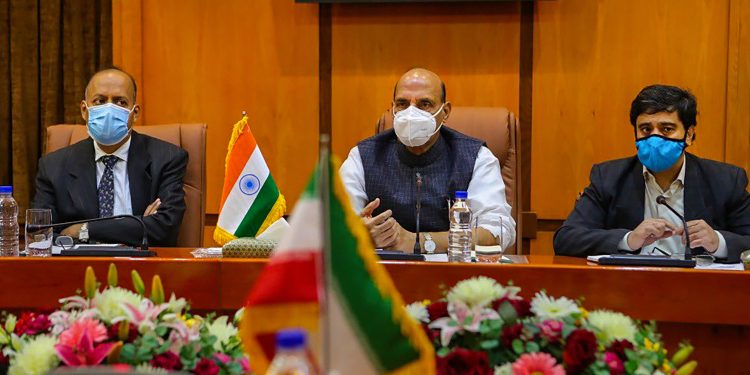Tehran: Defence Minister Rajnath Singh Sunday said he had a ‘very fruitful’ meeting with his Iranian counterpart Brigadier General Amir Hatami and discussed ways to bolster bilateral cooperation and exchanged views on regional security issues, including the situation in Afghanistan.
Singh reached Tehran from Moscow Saturday on a transit halt after concluding his three-day visit to Russia where he attended a meeting of the Shanghai Cooperation Organisation (SCO) defence ministers. He also held bilateral talks with his counterparts from Russia, China and the Central Asian countries.
“Had a very fruitful meeting with Iranian defence minister Brigadier General Amir Hatami in Tehran. We discussed regional security issues including Afghanistan and the issues of bilateral cooperation,” Singh said in a tweet.
“Both the Defence Ministers discussed ways to take forward bilateral cooperation and exchanged views on regional security issues, including peace and stability in Afghanistan,” Singh’s office said in a separate tweet on the meeting held at the request of the Iranian defence minister.
The meeting between the two ministers took place in a “cordial and warm atmosphere,” it said, adding that the leaders emphasised upon the age-old cultural, linguistic and civilisational ties between India and Iran.
Iranian Defence Minister Hatami and his Indian counterpart Singh held talks in Tehran on international, regional and bilateral issues, Iran’s official Irna news agency reported Sunday.
Visit of Singh is the first travel of a top Indian official to Iran since the outbreak of the coronavirus pandemic in December 2019, it noted.
Iran and India enjoy traditional friendly ties. Iranian and Indian officials hold regular consultations on close cooperation to ensure regional peace and security, the report added.
Singh’s visit to Iran, a major regional player, is considered to be significant as it came after he voiced India’s deep concern about the situation in Afghanistan and the Persian Gulf.
India has been keenly following the evolving political situation in the strife-torn Afghanistan after the US signed a peace deal with the Taliban in February. The deal provided for the withdrawal of American troops from Afghanistan, effectively drawing curtains to Washington’s 18-year war in the country.
In his address at the combined meeting of defence ministers of the SCO Friday, in the Russian capital, Singh said that the security situation in Afghanistan remains a concern.
According to a recent UN report, as many as 533 Afghan civilians – including more than 150 children – were killed in war-torn Afghanistan due to fighting.
At the SCO meeting, Singh said: “India will continue to support the efforts of the people and government of Afghanistan for an Afghan-led, Afghan-owned and Afghan-controlled inclusive peace process.”
India has been a key stakeholder in the peace and reconciliation process in Afghanistan. It has been supporting a national peace and reconciliation process. New Delhi has also been maintaining that care should be taken to ensure that any such process does not lead to any ‘ungoverned spaces’ where terrorists and their proxies can relocate.
There have been global concerns over Pakistan’s support to the Taliban and other terror groups operating in Afghanistan.
At the SCO meeting, Singh had also voiced India’s concern over the situation in the Gulf region, vital for the country’s energy needs.
A series of incidents in the Persian Gulf involving Iran and the US in recent months have flared up tension in the region.
“We are deeply concerned about the situation in the Persian Gulf,” Singh said in his address at the SCO meeting on Friday.
“We call upon countries in the region – all of which are dear and friendly to India, to resolve differences by dialogue based on mutual respect, sovereignty and non-interference in internal affairs of each other,” Singh said.
Iran has threatened to disrupt oil shipments through the Strait of Hormuz if the US, which has already imposed crippling sanctions on Tehran over its nuclear programme, tries to strangle its economy.
India and Iran have strong commercial, energy, cultural and people-to-people links.
India-Iran commercial ties were traditionally dominated by Indian import of Iranian crude oil. In 2018-19 India imported USD 12.11 billion worth of crude oil from Iran.
However, following the end of the Significant Reduction Exemption period on May 2, 2019, India has suspended importing crude from Iran, according to the Indian Embassy here.
The US had asked countries, including India, to cut oil imports from Iran down to “zero” by November 6, 2019 or face sanctions.
The bilateral trade during 2019-20 was USD 4.77 billion, a decrease of 71.99 per cent as compared to the trade of USD 17.03 billion 2018-19. What is significant is that Indian exports to Iran between 2011-12 and 2019-20 have grown by 45.60 per cent, according to the website of the mission.
PTI






































